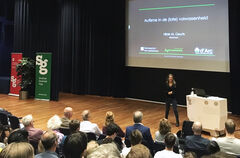“The biggest misconception about autists? That they have no empathy”
A sold-out Blauwe Zaal shows that the subject is relevant: autism in adults. The various documentaries on TV and on Netflix, such as ‘Het beste voor Kees’ (The best for Kees) and Atypical, contributed to the attention for the subject. Studium Generale gives a lecture about this on May 29th.
Neuropsychologist Prof. Hilde Geurts from the University of Amsterdam is greeted with loud applause, to which she immediately responds: “I speak at autism conferences often and we rarely applaud there. That’s because many autistic people can really feel overwhelmed by such noise. We have an alternative (moves with arms and hands in the air, ed.). But sometimes it is nice to hear applause.” Geurts prefers to speak about autistic people and not about people with autism or people with an autistic disorder. "This has to do with the preferred way of addressing that the target group has expressed towards me."
More autism in Eindhoven
Autistic people have a different way of information processing. Geurts asks the audience who knows an autistic person. Almost all hands go up in the air. Autism is relatively common in Eindhoven. Does the presence of many technical companies and the Technical University have anything to do with that? Students in technical and natural sciences are more likely to have autistic traits than students in other disciplines.
Cambridge University has researched this, comparing the number of autism diagnoses in Haarlem and Utrecht with the number of diagnoses in Eindhoven. In Eindhoven there were significantly more. These cities were chosen because they are comparable in terms of population and socio-economical status, but differ greatly in terms of the number of technical jobs.
Geurts of course gets the question ‘Why could there be a difference?’ "Well, why, that is not fully clear. It may have something to do with the large number of technical companies that are present here and that autistic people are more likely to find the according professions pleasant. This thought dates from the time that men were diagnosed with autism much more often than women and from the time autistic people were thought to be better at technical professions. Another reason that the diagnosis is made more often in Eindhoven may be that there is better care for autists, and autists therefore move here more often. I think it can be a combination of the various possible causes," Geurts explains.
An important limitation for this research: it was conducted among children. That is precisely the problem that Geurts also cites in her lecture: “A lot of research has been done on autism in children, but there are only a few studies of autism in adults and the elderly. To be able to say something about the future perspective of autistic adults, we must first do more research on that age group. You could compare it to wanting to say something about butterflies while you mainly did research on the caterpillars.”
Pioneer
Geurts is a pioneer on autism in adults and in her research she tries to find an answer to the question whether autistic people deteriorate faster, as fast or less fast as they get older. In any case, it is clear that autistic people use their semantic memory less and they develop a different strategy at an early stage in which they perceive details better. As ordinary people get older, their semantic memory diminishes which they suffer from, but that is less of a problem for autists because they use it less and already have an alternative. Their developed coping strategy therefore seems more valuable at a later age.
The audience is also interested in the difference between men and women in autism. “In the past, that difference was considered larger. But now there is about a 2:1 male-female distribution. Women are mainly diagnosed later because they compensate more to hide their autism and therefore stand out less. Compensating can result in overestimation, which puts pressure on the autist. But at the same time, underestimation of autists is also a risk,” Geurts reminds us. "Then people think ‘oh he or she could not do that before, so that person will never be able to do that,’ while differences evolve within autists as they get older."
“The biggest misconception about autists? That they have no empathy and don't care about the emotions or feelings of others. That’s really nonsense. There are also autistic people who feel the emotions of others so strongly that it overwhelms them. And that they have no humor can also be dismissed, as it is a misconception as well,” Geurts points out.
Do you yourself suffer from autism or another functional impairment and are you a TU/e student? Then the university can help you, among other things, with your study planning and to limit a possible study delay. It is important to register yourself so that the university can help you in time. You can make an appointment with a study advisor from your department to discuss this further or get in touch with ESA.



Discussion